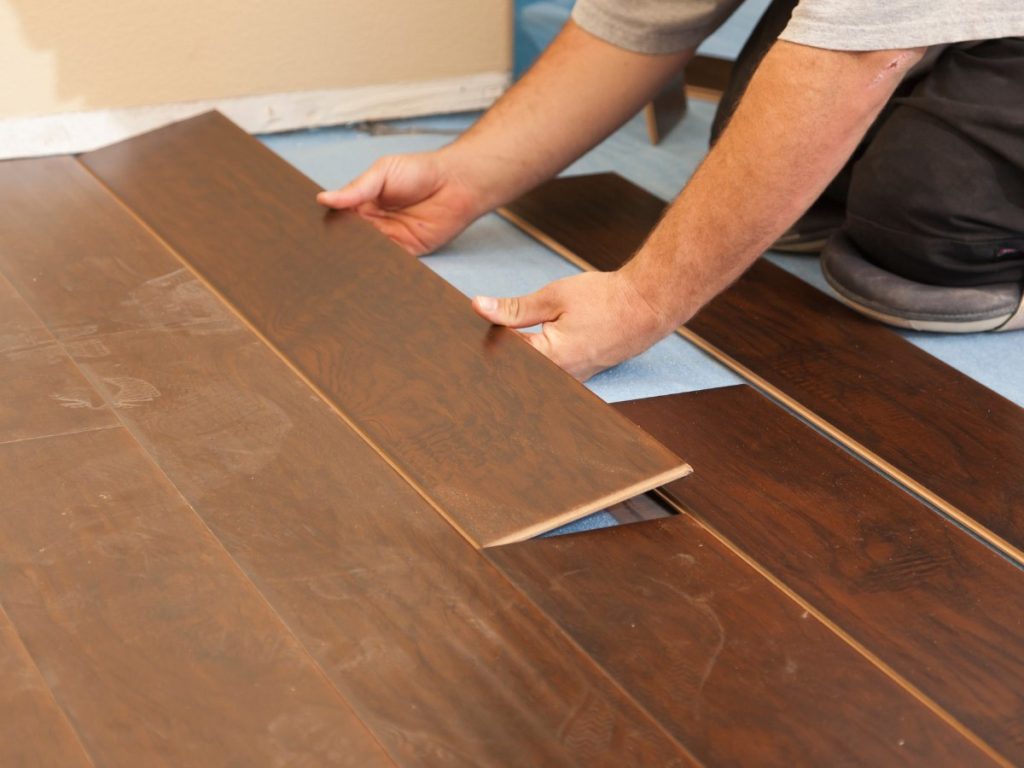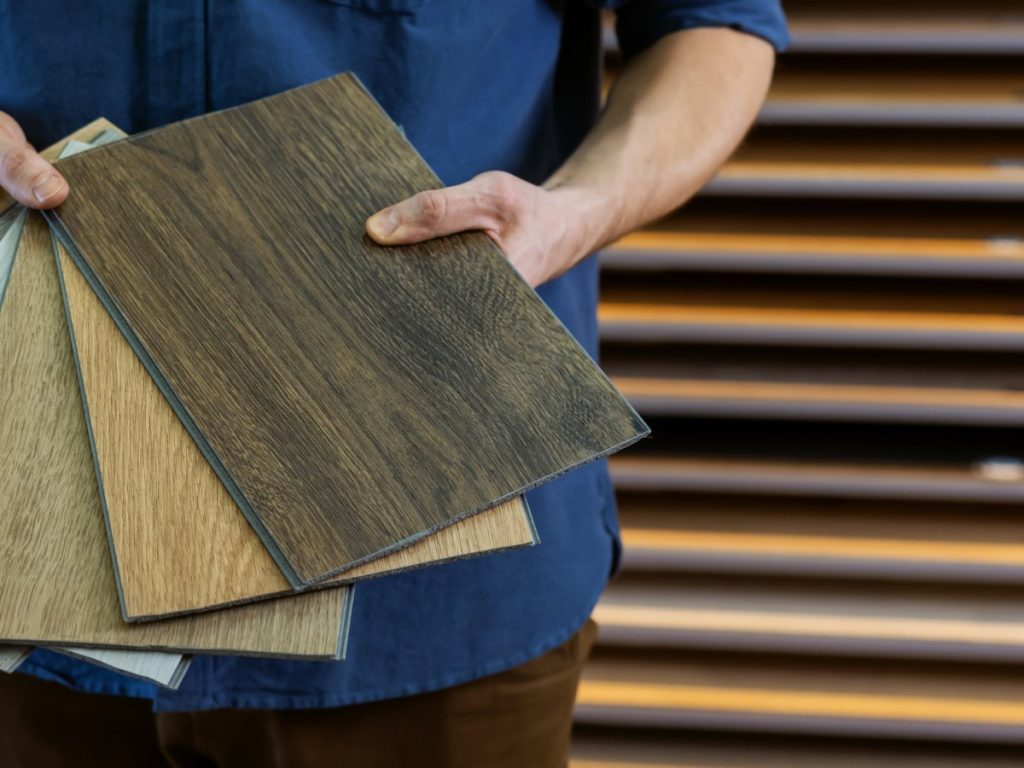Choosing the right flooring is one of the most important decisions you’ll have to make regarding kitchen remodeling. The kitchen floor is subjected to heavy foot traffic, spills, and stains, so it needs to be durable, easy to clean, and resistant to water damage. Additionally, the flooring material should enhance the aesthetic appeal of your kitchen, complementing the overall design and style preferences.
With so many kitchen flooring options, finding the perfect choice for your space can seem overwhelming. In this blog, we will explore the essentials of kitchen flooring, delve into popular options, analyze their benefits and drawbacks, consider how lifestyle factors influence flooring choices, and guide you through the decision-making process. By the end of this article, you will have the knowledge and insights needed to choose the best flooring option for your kitchen with See the Future Construction Inc.
Evaluating the Essentials for Kitchen Flooring
Before exploring specific flooring options, let’s evaluate the key factors when selecting kitchen flooring. The best flooring for your kitchen should possess certain qualities to ensure longevity and performance in this high-traffic area. You’ll want to look for something durable, easy to maintain, resistant to water damage, and suitable for heavy foot traffic. By evaluating these essential features, you can narrow your choices and find the flooring option that best suits your kitchen floor needs.
Durability and Maintenance
Durability is of the utmost importance when it comes to kitchen flooring, as it should withstand the test of time and the demands of a busy kitchen. High foot traffic, spills, and heavy kitchen equipment can damage the floor, so choosing a material that can handle these challenges is crucial. Additionally, easy maintenance is essential for kitchen flooring, as spills and stains are bound to happen in this area of the house.
Regarding kitchen flooring options, there are several types to choose from, including hardwood, luxury vinyl planks, laminate, ceramic tile, natural stone, and more. Each type of flooring has its own durability and maintenance characteristics, so it’s essential to evaluate these factors before making a decision.
Cost Effectiveness
Cost-effectiveness is essential when selecting kitchen flooring, as it affects the upfront investment and long-term maintenance costs. Different types of flooring have varying installation costs, so it’s essential to determine your budget and find the best option that offers value for money.
Ultimately, the best flooring option for your kitchen will be the one that offers the right balance of cost-effectiveness, durability, and long-term value. By evaluating the type of flooring that fits your budget and meets your needs, you can make a practical and financially sound informed decision.
Aesthetic Appeal
In addition to durability and cost, aesthetic appeal is crucial when selecting kitchen flooring. The flooring material you choose should align with your style preferences and complement the overall design of your kitchen space. Various types of flooring offer a wide range of designs, colors, and styles to cater to different aesthetic preferences.
Hardwood flooring is a popular choice for a timeless and classic look. It’s natural warmth, and beauty can enhance the aesthetic appeal of your kitchen, adding an elegant touch to the space. Hardwood floors come in various wood species, each offering unique grain patterns and colors, allowing you to choose the perfect fit for your kitchen style.
When choosing kitchen flooring based on aesthetic appeal, it’s essential to consider how different designs and colors can impact your kitchen space’s overall look and feel. Lighter colors can make a small kitchen feel more spacious, while darker colors can create a sense of warmth and coziness. By selecting a flooring material that aligns with your aesthetic preferences, you can create a kitchen that reflects your unique style and enhances the visual appeal of the space.
Exploring the Top Kitchen Flooring Options
Now that we’ve evaluated the essentials of kitchen flooring let’s delve into the top options available. These flooring choices have proved popular among homeowners, offering excellent durability, aesthetic appeal, and functionality for kitchen spaces.
By exploring these options, you can make an informed decision and find the flooring option that best suits your kitchen floor needs.
Hardwood Flooring – A Classic Choice
With their natural warmth and beauty, hardwood floors are a timeless addition to kitchens, offering a cozy ambiance. Renowned for exceptional durability, solid hardwood flooring is a long-term investment that can withstand the demands of a busy kitchen. One of the distinct advantages of hardwood floors is their ability to be sanded and refinished multiple times, ensuring longevity.
Additionally, solid bamboo flooring presents an excellent alternative for kitchen spaces, combining sustainability with elegance. The scratch resistance of hardwood floors makes them a practical and attractive choice for areas with high foot traffic.
Luxury Vinyl Plank – The Modern Alternative
The modern alternative to traditional kitchen flooring, luxury vinyl plank (LVP), offers impressive water resistance, making it an ideal choice for kitchens. Beyond functionality, the aesthetic appeal of luxury vinyl planks enhances kitchen spaces, providing a versatile and stylish flooring option. Regarding durability, LVP is an excellent choice for kitchen floors, offering long-term performance and easy maintenance.
Additionally, the wide range of designs and colors available in vinyl flooring options allows homeowners to select the perfect style for their kitchen space. With its resistance to water damage, luxury vinyl plank emerges as a highly suitable and practical flooring option for modern kitchens.
Engineered Hardwood – A Balance of Quality and Affordability
For kitchen flooring, engineered hardwood offers the durability and aesthetic appeal of wood flooring while providing added stability. Its construction ensures resilience to moisture and temperature changes, making it suitable for the kitchen environment.
Engineered hardwood is an excellent option due to its resistance to water and temperature fluctuations, making it a good choice for long-term use. Its installation in kitchens is feasible, and the price point makes it an excellent choice for those seeking quality and affordability. With various colors and styles available, engineered hardwood is the best option for kitchen flooring, catering to diverse preferences and needs.
Delving into the Benefits and Drawbacks of Each Option
Assessing the benefits and drawbacks of each flooring option is crucial. Understanding the advantages and disadvantages of natural stone, wood flooring, cork flooring, and ceramic tile will help make an informed decision. Additionally, considering water-resistant options like sheet vinyl, luxury vinyl tile, and porcelain tile is essential in terms of durability.
The core layers of the flooring and various colors available must also be considered when choosing the suitable material for the kitchen, whether traditional or polished; concrete floors are a long-time favorite and are known for being a better choice. Evaluating new flooring, like concrete flooring, will also be beneficial for finding the best floor for the kitchen.


Advantages and Disadvantages of Hardwood Flooring
Hardwood flooring brings an enduring charm and value to kitchen areas, elevating the visual allure of the space with its natural beauty. It requires regular upkeep to ensure long-lasting durability, making it imperative for homeowners to invest time in maintenance.
However, hardwood floors are prone to scratches and water damage, demanding cautious handling and protection against moisture. While they offer timeless elegance, the initial installation cost may be higher than other flooring alternatives, requiring a considerable investment upfront.
Pros and Cons of Luxury Vinyl Plank
Luxury vinyl planks are water resistant, making them perfect for kitchen flooring. They are durable, resistant to scratches, and easy to clean, ideal for high-traffic areas.
They cater to diverse aesthetic preferences with various designs, colors, and styles. Simple installation and cost-effectiveness make them suitable for various budgets. Moreover, luxury vinyl planks provide the look of hardwood without the maintenance requirements.
The Good and the Bad of Engineered Hardwood
With its enhanced durability and water resistance, engineered hardwood flooring offers the timeless elegance of wood while being more resistant to water damage. Its natural feel and aesthetic appeal make it an excellent option for kitchens, catering to the need for style and functionality.
Additionally, its resistance to temperature and humidity changes makes it ideal for kitchen flooring. While professional installation may be necessary, the long-term benefits outweigh the initial cost, making it an excellent choice for homeowners. In terms of durability, engineered hardwood is a great option, providing the look of hardwood with added resilience and water resistance.
Understanding How Lifestyle Influences Your Choice of Flooring
It is crucial to consider how your lifestyle impacts your flooring choice. Family size and pets can lead to wear and tear, making water-resistant options like luxury vinyl tile popular. Cooking habits and frequent spills call for easy-to-clean materials such as sheet vinyl or ceramic tile in various colors.
Durable and aesthetically pleasing options like natural stone or wood flooring are the best choice for those who entertain frequently. Assessing your lifestyle’s impact on your flooring decision ensures that you select the suitable material for your kitchen, considering long-term durability and maintenance.
Do-It-Yourself Vs. Hiring a Professional for Flooring Installation
When choosing between DIY and professional flooring installation, it is crucial to weigh the cost savings and potential pitfalls of taking on the project yourself, especially considering its complexity.
While DIY projects offer flexibility, professional installation ensures exceptional durability, precision, and long-term performance. Opting for professional installation guarantees quality workmanship and provides peace of mind. It’s essential to assess the benefits of professional installation, particularly for flawless and long-lasting results.
Analyzing the Cost Savings and Pitfalls of DIY Installation
When considering DIY installation, weighing the potential cost savings against the time, effort, and skill required is essential. Successful DIY flooring installation demands a thorough assessment of the learning curve, necessary tools, and materials. It’s essential to factor in the challenges and complexities of DIY projects, along with the time commitment and potential setbacks that may arise. While DIY may initially save costs, the professional installation offers expertise, efficiency, and long-term value, potentially outweighing the DIY cost savings.
Choosing the right flooring for your kitchen involves considering durability, cost, and aesthetic appeal. Hardwood flooring is a classic choice that adds warmth and elegance to any kitchen. Luxury vinyl plank is a modern alternative that offers durability and water resistance. Engineered hardwood strikes a balance between quality and affordability. It’s essential to weigh the advantages and disadvantages of each option based on your specific needs and preferences.
Additionally, lifestyle factors, such as family size, pets, and cooking habits, should be considered. Whether you decide to take on the installation yourself or hire a professional, consider the cost savings and potential pitfalls. Ultimately, the perfect flooring option for your kitchen will depend on a combination of these factors.

